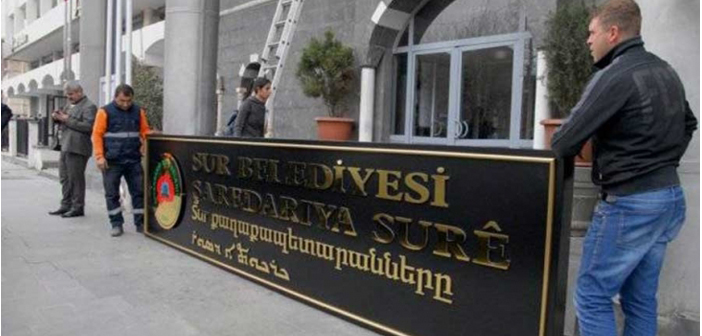DIYARBAKIR, Turkey (A.W.)—The Armenian and Assyrian (Neo-Aramaic) writing on the Sur municipality building in Diyarbakir was recently removed and replaced by a Turkish flag. Istanbul-based Armenian bilingual newspaper Agos reported on Dec. 8 that the sign, which was placed in 2012 and was written in four languages (Turkish, Kurdish, Armenian, and Assyrian), was ordered to change by a state-appointed monitor.
The four-language sign was the initiative of then Sur Mayor Abdullah Demirbaş—a longtime advocate for Armenian rights. Demirbaş worked tirelessly for the Surp Giragos Church reconstruction in 2011. On the occasion of the re-opening of the church, he addressed the Armenians who had gathered there: “Welcome, my brothers and sisters! We are very glad to see you in your own country, your own city!”
He presided over the official inauguration of the Monument of Common Conscience on Sept. 12, 2013, that was erected in Diyarbakir. During those ceremonies, in the name of the Kurdish people, he apologized for the atrocities committed against the Armenians and Assyrians. While visiting Providence, R.I., in 2013, he addressed the Armenian community at Sts. Vartanantz Church, and laid flowers at the Armenian Genocide Monument there.
On Aug. 9, 2015, Demirbaş was arrested by Turkish authorities in Diyarbakir on trumped-up charged. He was imprisoned until October 2015 and was only released due to health concerns, as he suffered from deep vein thrombosis, a serious condition where blood clots form in a vein deep inside the body.
Read also
Demirbaş has been continually targeted by the ruling authorities. His latest arrest was part of a larger wave of charges filed against a number of Kurdish politicians following the June 2015 general elections in Turkey, when the ruling Justice and Democracy Party (AKP) won a majority in parliament, but failed to secure a supermajority. Those elections brought the pro-Kurdish Peoples’ Democratic Party (HDP) into parliament, with 13 percent of the vote. Failing to form a government following the June elections, the government scheduled a snap election on Nov. 1, 2015; the months leading up to the elections saw a number of terror attacks (such as in Suruc and Ankara), a renewed war against the Kurdish Workers’ Party (PKK), and the targeting of Kurdish-dominated areas in the southeast of the country, where the HDP had fared especially well during the elections. Diyarbakir’s Sur district suffered tremendously during this campaign of violence, which transformed the streets into a war zone.
“It is my duty as a human to wish for those with whom I live whatever I wish for myself, and it is worth doing so. This is why I am wishing freedom for the Kurds and I will also wish freedom for the Armenians, Assyrians, Chaldeans, Yezidis, and Alevis, no matter what I might face as a result. I know that even if I sleep in a jail cell for a thousand years, I will keep on believing that,” Demirbaş said in an interview with former Armenian Weekly editor Nanore Barsoumian back in March.

























































